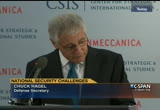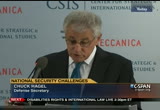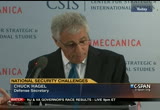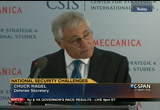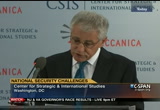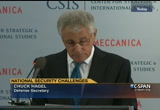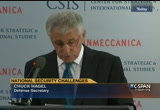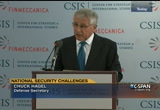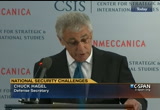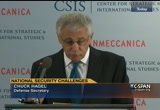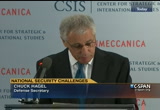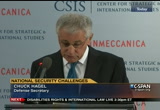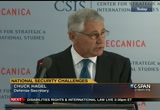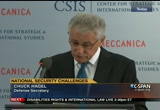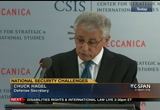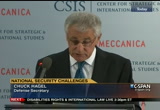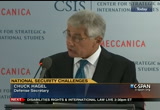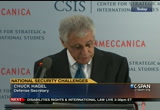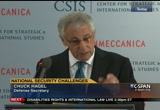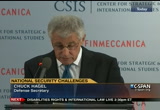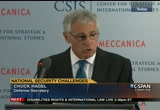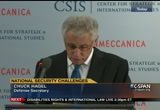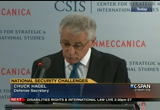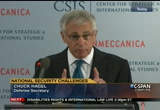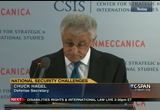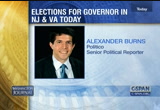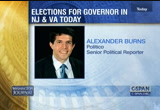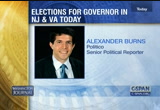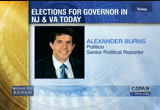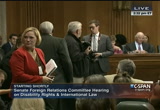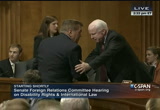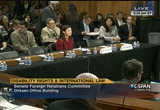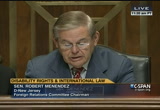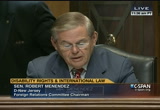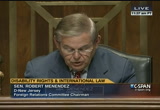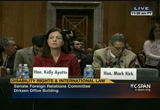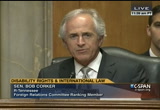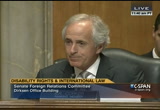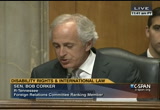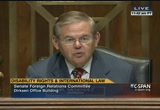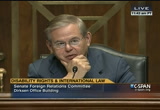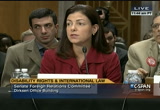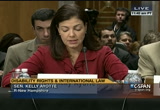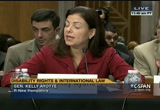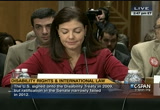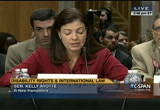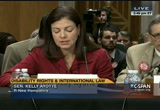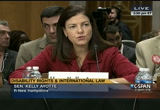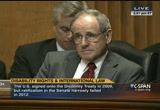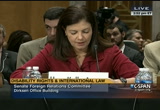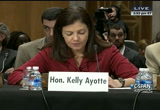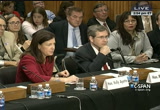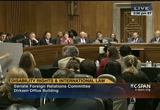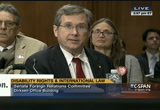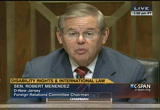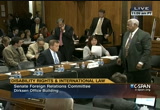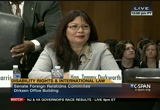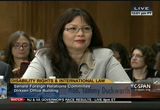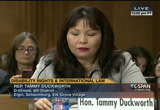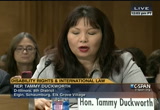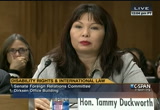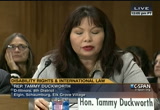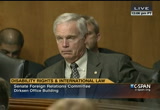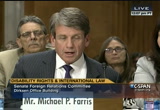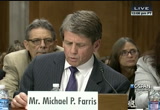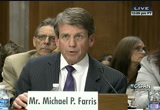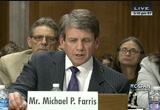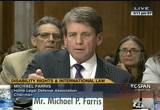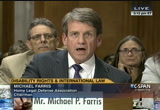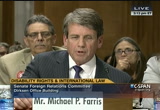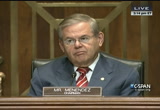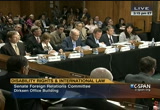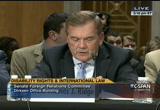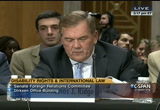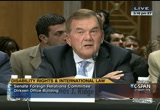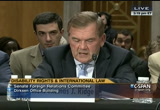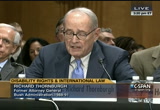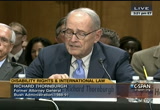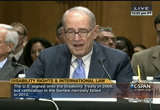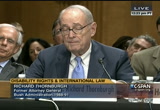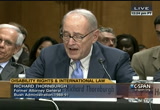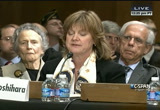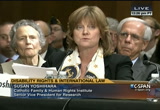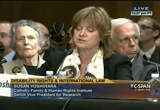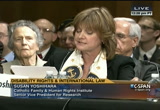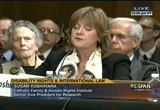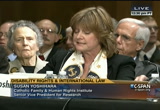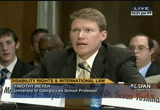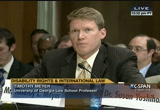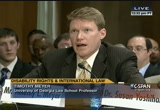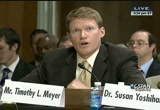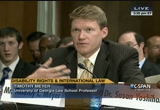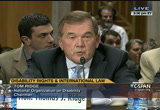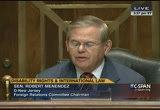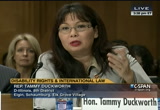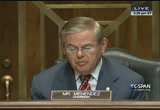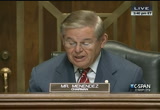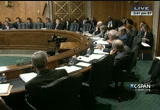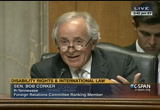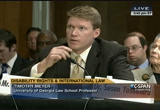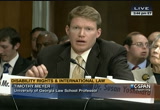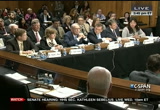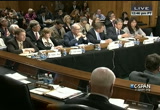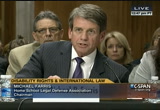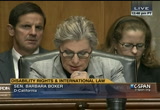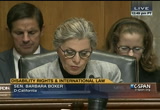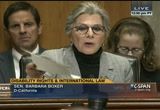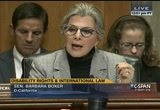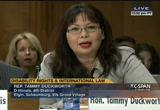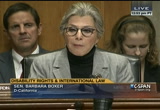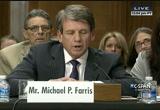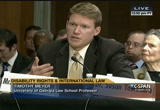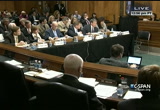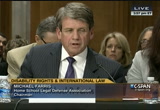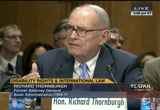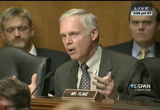tv Key Capitol Hill Hearings CSPAN November 5, 2013 2:00pm-4:01pm EST
2:00 pm
regions in the world. regional tensions in the middle east and elsewhere continue to have the potential to erupt into larger scale conflicts, drawing some of the most complex threats remain from the nontransparent and heavily armed nationstates like iran and north korea. we continue to adapt to present and emerging threats from nonstate groups, terrorists, and criminal networks, and from w ithin weak states. statehood can be a fiction that hides dangers lurking beneath. all of these challenges will be with us for the foreseeable future. there is not a short-term vision to these are a first century threats. we must manage through these realities as we engage these
2:01 pm
complex problems. staying focused on our long-term interests and long-term objectives and outcomes. the imperfect outcomes may be the most we can expect, working our way toward the higher ground of possible solutions. leveraging all aspects of our power, we must multiply and enhance our efforts by working through coalitions of common interest like nato. this is in fact our future. just as we have done since world war ii, but it now may be more essential than ever before. while these challenges are not america's responsibilities alone, they will demand america's continued engagement. no other nation, no other nation has the will, the power, the cast the, "he, and a network of alliances to lead international community in addressing them. however, sustaining our leadership will increasingly
2:02 pm
depend not only on the extent of an great power, but in appreciation of its limits and a wide appointment of our influence. we must not fall prey to the notion of american decline. that is a false choice. and far too simple an explanation. we must remain the world's only global leader. the insidious disease of hubris can undo america's great strengths. we almost not fall prey to hubris. national and personal executives about change and the rate of change will continue to dominate much of our public debate. these must he placed in a broader on texts, particularly because many of the challenges facing us are political, not structural. we remain the world's preeminent military and economic power, and
2:03 pm
as we deal with new constraints on defense spending, the united states will continue to represent there'll a 40% of global defense expenditures. most of the world's other leading military powers are america's close allies. what has always distinguished the united states is not simply the existence of our great power . rather, it is the way in which we have used our power for the purpose of trying to make a that her world. we have made mistakes. we will continue to make mistakes. but we cannot allow the overhanging threat of future miscalculation and mistakes to paralyze or intimidate our will and our necessary decision making today. in the 21st century united states must continue to be a force for and an important symbol of humanity, freedom, and progress for all mankind.
2:04 pm
we must also make a far better effort to understand how the world sees us and why. .e must listen more we must listen more. after more than a decade of costly, controversial, and at times open-ended war, america is redefining its role in the world. the same time more americans including officials are growing skeptical about our country plus foreign engagements and responsibilities. only looking in word is just is just as deadly a trap as hubris, and we must avoid both in pursuing a successful foreign-policy in the 21st century. america's role in the world should reflect the hope and promise of our country and the possibilities for all mankind, tempered with a wisdom that has been the hallmark of our character. that means pursuing a principled thatngage realism
2:05 pm
employees diplomatic, economic, and security tools as well as our values to advance our security and our prosperity. as he looked out across the strategic landscape, the united states military will remain an essential tool of american power in foreign-policy. but one that must be used wisely, precisely, and justus league. most of the pressing challenges i described today have important if a national, and global, economic and cultural components, and they cannot and will not be resolved by only military strength. forward into a historically unpredictable world, we will need to place war and infosys on our civilian incidents of power while adapting our military so that it remains strong, second to none, and relevant in the face of threats markedly different from what she did during the cold war and over the past two decades.
2:06 pm
america'sst hard -- hard power -- but our success ultimately depends on not on any one instrument of power, it depends on all of our instruments of power, working together. and it depends not only on how well we maintain and fund all of our instruments of power, and how well they are balanced and integrated with each other. leaders and strategists, including here at csis, have been arguing for this shift for some years. in 2007, i was honored to serve on smartis commission power. that commission was led by john hamry. developing an integrated strategy, resource- based, and will kit to achieve american objectives.
2:07 pm
its conclusions were echoed soon after by secretary of defense bob gates, who spoke on this topic here, or at the last csis in early 2008. we have a long way to go to fulfill the promise of that commission. we are moving toward it. president obama is resolved to take military action to respond to the assad's regime's use of chemical weapons help create an opening with russia, which we pursued. that led to a un security council resolution and to the involvement of the organization for the prevention of chemical weapons inspectors on the ground in syria, working to oversee the removal and distraction of chemical weapons. we are on a course to eliminate one of the largest stockpiles of chemical weapons in the world. has not only maintain
2:08 pm
military pressure on the assad regime and will continue, it has also developed the technology that may very well be used to destroy these chemical weapons. we may have another possibility with iran, where we are engaging on a diplomatic path to prevent iran from obtaining a nuclear weapon. united states is clear eyed about the challenges and the uncertainties that lie ahead on this path. and the need for iran to demonstrate its seriousness through its actions. we will maintain a strong and ready military presence in the military golf and the broader middle east to determine their stabilizing days -- their destabilizing activities. the multidimensional challenges confronting us with iran and of there but two pieces global complexities we will continue to face in the 21st century. cases, our military power has been an important part
2:09 pm
of the work to possibly find these poetic resolutions. diplomatic resolutions. we recognize that there is risk in all of this. we do not live in a risk-free world. we never have. will. never we must work to find the smartest and most effective solutions to problems. military force must always remain an option, but it should always be an option of last resort. the military should always play a supporting role am not believing role, in america's foreign policy, and an example of the balance we are seeking to achieve is the renewed engagement in the asia-pacific region. power plays atary stabilizing role in the region. helping advance security, stability, and prosperity through our commitments to our allies and our partnerships, and
2:10 pm
with them, they build new capabilities. the department of defense is not in the lead for the rebalance of the asia-pacific. it is an effort that also consists of important diplomatic, economic, trade, and cultural initiatives. all these areas will remain a continueity as we to implement the strategy. going forward, the united states us use military strength as a supporting component of a comprehensive strategy to protect and advance american interests. this requires striking a careful allen's between all element of our power. just as overdependence on the military carries with it risks and consequences, letting our military strength after fee wouldinvite -- atrophy
2:11 pm
invite disaster. the united states must sustain the kind of military power that gives diplomacy strength, that assures the allies around the world, and inters our adversaries. we must continue to have a military of unmatched fighting power, and we must be prepared to respond to confrontation and crisis in a new and profoundly volatile world. allies closely with our and our partners. the united states military has always proved capable of adapting to new realities and geopolitical alignments, even when resources were limited. in the face of reduced deficits and defense budgets, new challenges, our defense institutions must be shaped to continuingmilitary's readiness. that includes a continued focus on capacity building for our allies and our partners and working closely with them and
2:12 pm
through alliances. but today, we face the danger that our current budget crisis and the steep, abrupt, and deep cuts imposed by sequestration will cause an unnecessary strategically unsound and dangerous degradation in military readiness and capability. as you know, the department is facing sequester level cuts in the order of $500 billion over 10 years. the 10-in addition to inr $487 billion reduction eod budget that is already underway. fast, too are too abrupt, and to irresponsible. dod took a $37 billion sequester cut during the past fiscal year, and we could be forced to absorb a $52 billion sequester cut this fiscal year. we're looking at nearly one dollar trillion in dod cuts over
2:13 pm
this 10-year period unless there is a new budget agreement. we are currently operating under no budget, under a continuing resolution which continues to mostnt dod with one of its difficult challenges, uncertainty. dod cannot responsibly, efficiently, and effectively plan, strategists, and implement national security policies with this cloud hanging over it. it forces us into a very bad set of decisions. provide thet act to department with time and flexibility to implement spending reductions more strategically. we do not have the option of assumingreality or something will change. leaders across the department will continue to give their best clear eyed assessment to america 's elected leaders about sequestration's damaging impact on military readiness, morale, and capabilities.
2:14 pm
but we also must prepare the force for whatever lies ahead. with a clear appreciation of dod lost vital responsibility of protecting this nation. , my topcoming secretary institutional priority has been to help lead the department of defense in not only responding to these physical and strategic challenges, but shaping our to our advantage, and to the extent we can, controlling our own destiny. through my first weeks in office i directed a she's using choices in management review about which over the course of several months identify options for reshaping our force and our institutions in the face of difficult budget scenarios. that review pointed to the stark choices and trade-offs in military capabilities that will levelquired if sequester- cuts persist. it also identified opportunities to make changes and reforms.
2:15 pm
above all, it underscored the reality that dod still possesses resources and options. we will need to more efficiently maximize them, more efficiently match our resources to our most important national security requirements. we can do things better. we must do things better. and we will. to that end, in the months since the strategic review was completed, theaters across dod and the military services have been working on our longer-term budget strategy, particularly to the department's quadrennial defense review. a much-needed realignment of missions and resources is being undertaken across the department. this will require a certificate change across every aspect of our defense enterprise. i have identified six areas of for our budget and should
2:16 pm
you planning efforts going forward. working closely with the service retaries, these priorities will shape the priorities of our defense institutions from for years to come. first among we will continue to .ocus on institutional reform coming out of more than a decade of war and budget growth, there is a clear opportunity and need to reform and reshape our entire defense and a price including paring back the world largest back office, and a first step we took this summer was to reduce budgets across the department, beginning with the office of the secretary. our goal is not only to direct more of our resources to real military capabilities and readiness, but to make organizations flatter, more spots of to the needs of our men and women in uniform. second, we will reevaluate our
2:17 pm
force planning construct. the assumptions and the scenarios that guide how the military should organize, train, and equip our forces. i've asked our military leaders to take a close look at these assumptions, question these past beumptions, which will also reevaluated across the services as part of the qdr. the goal is to ensure they better for our goals and the shifting it strategic involvement, the evolving capacity of our allies, real world threats come and the new military capabilities that reside in our force and in the hands of our potential absurdist. we was make sure that contingency scenarios drive force structure decisions and not the other way around. a third priority will be preparing for a prolonged military readiness challenge. the services have rightly
2:18 pm
protected the training and forces toof deploying ensure that no one goes into a harm's way unprepared. that is our highest responsibility to our forces. already, we have seen a readiness of non-deploying units suffer as training has been curtailed, flying hours reduced, and exercises being canceled. the strategic choices and management review show that the persistence of sequester-level cuts could lead to a readiness crisis, and unless something changes, we have to think urgently and creatively about how to avoid that out,, because we are consuming our future readiness now. we may have to accept the reality that not every unit will be at maximum readiness, and readinessof a tiered system is perhaps inevitable.
2:19 pm
this carries the risk that the president of the united states would have fewer options to fulfill our national security objectives. a fourth prayer date will be protect investments in emerging military capabilities, especially space, cyber, special operations or systemic and intelligence, surveillance, and reconnaissance. as our potential adversaries invest in more capabilities as he to frustrate our traditional advantages, including our freedom of action, and access, accesses around the world, it will be important to maintain our decisive technological edge. this has always been a hallmark of our armed forces even as war has remained and will remain a fundamentally human endeavor. war is a fundamentally human endeavor. our fifth priority is balance. across the services we will need to carefully reconsider the mix between capacity and capability,
2:20 pm
between active and reserve forces, between forward stationed and home-based forces, between conventional and unconventional war war fighting capabilities. in some cases we will make a by fertilizing a smaller, modern, and capable military over a larger force with older equipment. will also favor a globally over aand engaged force garrison force. we will look to better leverage the reserve components, tempered by the knowledge and experience that part-time units and ground forces especially cannot expect to perform at the same levels as full-time units and at least in the conflict's early stages. in other cases we will seek to preserve existing balance by trying to control areas of runaway cost. priority,ixth personnel, may be the most
2:21 pm
difficult. without tears attempts to achieve significant savings in this area, which consumes roughly now half of the dod budget and is increasing every year, we risk becoming an unbalanced force, one that is well compensated, but poorly trained and equipped, with limited readiness and capability. going forward we will have to make hard choices in this area in order to ensure that our defense enterprise is sustainable for the 21st- century. arrest must permit any form or forms -- congress must permit meaningful reforms. we need congress to make choices to bend the cost curve of personnel, while meeting all of our responsibilities to all of our people. even as we pursue change across the department of defense, the greatest responsibility of leadership will always remain the people we represent, our men and women in uniform, their
2:22 pm
families, and our dedicated civilian workforce. that is because institutions are platforms, frameworks, a societal structure for people. they're built to enhance the people they serve. it is people who change the world. institutions are instruments of change, but it is people who invest heavily, decide, inspire, and both prosper and suffer. when a nation commits its men and women to war, it is people who make the decision to go to war, it is people who fight and die in war. i begin my discussion today by talking about the importance of long-term thinking. america plus future has always depended on the balance of strategic thinking, decisive actions, and believe in our purpose. perhaps no one more divided that purpose and president dwight d. eisenhower. myit is appropriate to end
2:23 pm
thoughts this morning with an excerpt from his farewell address in 1961, which speaks to the challenges, the exact challenges facing us today in this very different world. he said, "america plus leadership and prestige depend not merely upon our unmatched but your progress, riches, and weitary strength, but on how use our power in the interests of world peace and human betterment. throughout america's adventure in free government, such basic purposes have been to keep the peace but to foster progress in human achievement, and to enhance liberty, dignity, and integrity among peoples and among nations. to strive for less would be unworthy of a free and religious people." very, very, wise words. the challenges that face our
2:24 pm
world, our nation, and all its so isutions are great, our unprecedented capacity to deal with those problems. never in the history of man has a nation possessed or the world possessed so much capacity to deal with these problems. we must not fear change, but rather embrace it. to strive for less would be unworthy of our character and error purpose, and we would feel future generations. that is not who we are. that is not our heritage. that is not our destiny. thank you. [applause] >> the senate foreign relations committee gavels in in under 10 minutes to consider an international treaty, the convention on the rights of
2:25 pm
persons with disabilities, also called the disability treaty, which if ratified would extend the disability rights of americans to disabled people in other countries. the number of people testifying including tom ridge and tammy duckworth. we will have that hearing live for you once a get started here on c-span. coming up this evening, election day in a number of states. we will have coverage on the governors races in virginia and new jersey. our coverage gets underway at 9:00 p.m. eastern, with your phone calls and more, and we look at those two races on this morning's "washington journal." if you had to tell people about these two races, why or why not it is important pay attention to them, what would you say? the new jersey race is very important for one reason and one
2:26 pm
reason only. that is chris christie's national future. if he wins this election by the margin that the polls show, that is a big feather in his cap. he is a potential candidate that will be able to say he was a conservative in a blue state. the virginia race is more complicated. there's not a dominant personality involved. there are two candidates. both are very flawed. the reason this is an important race is that we have seen over the last few years in the state of virginia that it has gone from a predominantly republican state to a real swing state. what we could see today is that virginia may be leaning to the democrats. this is an off-year election. virginia has historically elected a governor from the
2:27 pm
opposite party that controls the white house, and it seems like the trend will break tonight. host: talk about the significance in the virginia race. there is also a third candidate. caller: that is right. robert sarvis is running under the libertarian banner. he is trying to play off of divisions on the right. his tag line is open-minded and open for business. he has liberal views on abortion and gay rights, unlike ken cuccinelli. he has pretty permissive views of how the state ought to treat business. host: what is the turnout expected to be and who does that favor? caller: both sides agreed that the turnout will be north of 2
2:28 pm
million people. that is more than voted in the 2009 governor's race. it is really an open question. democrats feel good about the turnout. they feel that they have put a lot of time and money into making sure that they have voters show up today. republicans benefit from -- as much as virginia may be changing as a state, the people who tend to be most intense about voting tend to be the more conservative, the older electorate. host: we saw some high-profile people campaigning for both of these gentlemen. specifically, terry mcauliffe and ken cuccinelli. who are they and what does this tell you about the importance of this race? caller: the republicans had this parade of would-be presidential candidates.
2:29 pm
marco rubio and others, everyone except for chris christie. on the democratic side, you had barack obama and joe biden in the last 48 hours. in the last few weeks, you had bill and hillary clinton. they have been friends with terry mcauliffe for a very long time. i think it will be hard for people to say the big impact will be the overwhelming star power on the democratic side. republicans have a strong bench on the 2016 residential race. they do not have a lot of people who can go toe to toe with sitting and former presidents. host: what does polling look like in virginia? caller: it varies. it has been pretty consistent for months.
2:30 pm
the leads have varied from a few points to 12 points. in private polls, other races are probably closer to five points. the turnout you mentioned is key. do republicans show up, even though their candidate is trailing at this point. i think the democrats will show up, even though their candidate seems fine. host: talk about chris christie. if he wins reelection, what does he face? caller: he has a whole bunch of issues related to education, rebuilding the jersey shore, gay marriage, that were raised in his first term. these are not completely resolved. we see him as someone who certainly could run for president in 2016.
2:31 pm
it will be interesting to watch. before he gets sucked into the 2016 whirlpool, what will he prioritize? host: and barbara buono, his challenger -- anything to add about her? caller: i think we should wait and see what she has to say about this race. she is a candidate who has a number of hallmarks of a person who democrats would ordinarily support. she is an experienced legislator. she is a high-profile woman in a state that has not elected a female democratic governor. she never not gotten support from the national party. she is someone who could lay down some interesting straight talk. host: alexander burns, a senior reporter for politico. thank you.
2:32 pm
>> taking you live to the dirksen senate office building where the senate fornes relation committee -- senate foreign considercommittee will a disability treaty that would extend the display rights of americans to people in other countries. it should get underway shortly, and in the center of the screen, tom ridge, a disability rights advocate, among those testified ying. also tammy duckworth. the chairman of the committee, robert menendez, and john mccain published an editorial calling for the ratification of the treaty. , bobanking republican
2:33 pm
corker, talks about the treaty, saying since the u.s. already has the gold standard for disability rights with americans heh disability act, he says has concerns about the unintended legal consequences of the proposed treaty, including its pension of federal power beyond the current limits of the constitution. you're watching live coverage. they should gavel in shortly on c-span. [captions copyright national cable satellite corp. 2013] [captioning performed by national captioning institute]
2:34 pm
>> the hearing of the senate foreign relations committee will come to order. let me welcome our panelists and all of our guests who have come here today for this important hearing on the rights of roughly one billion people around the world them up with disabilities. let me quickly welcome three guests. among them, congressman tony o who has been a longtime champion of the rights of the disabled. ,hat may recognize ann cody representing the u.s. on three paraolympic teams. she was also nominated to be the vice president of the international paralympic committee. she understands it is not just enough to make the stadium
2:35 pm
accessible. you need to make surrounding restaurants and businesses accessible, and we thank you for being here or your advocacy as well. i also want to recognize a a leader in the disability community in macedonia. she is here to learn about transportation and independent living systems, and having public standards allows her to live in the united states, and yields to make that a reality at home as well. we thank you for your work, and we welcome you here. and i hope that what we do here will help you in your efforts. it makes clear we are here to do reatyatifying this t will help in the effort to give every disabled person to learn and travel without undue barriers. there are 5 1/2 million
2:36 pm
americans with this abilities, and now it is our turn to fight for them, to have full access and equal opportunity wherever they go. 138 countries have already ratified the treaty. comections will not automatically. it will take u.s. ratification and u.s. leadership to ensure the treaty's protections not only become a reality, but reflect american values. from the u.s. constitution, the treaty bars and levels of ows principles.r from the declination -- declaration and brorrows. by ratifying this treaty, we will be advocating for the adoption of american values around the world. at the end of the day, if we fail to ratify the treaty, the
2:37 pm
u.s. point of view and u.s. interests will be marginalized. we have heard from the state department that they have gotten their back in accessibility advocacy because we are not a party and we have have askedngo's who why american experts should be consulted on matters pertaining to a treaty we have not ratified. american businesses, the greatest accessibility innovators in the world, have expressed the fear that artemis standing on disability rights could be markets for accessible goods might not expand as quickly as they otherwise would, and in the future are businesses might very well have less success advocating for u.s. accessibility standards, creating the possibility that the world will adopt standards incompatible with american standards that have proven so. we need to ratify this treaty if we are going to lead the way in raising worldwide accessibility to the american standard. as we embark on the first of our
2:38 pm
two hearings on the disabilities treaty, i ask my colleagues to look past the fear mongering some have engaged on in this debate. ratifying this treaty will not mean bureaucrats in europe will determine how many parking spots are in your church's parking lot, as some have claimed. our job as the senate is required to see through the smoke screens and see clearly that this treaty is about putting america in the position to help lead the world so that has the, everyone opportunity to fully achieve their dreams and fulfill their god-given talents. let me introduce senator corker, the ranking member for his opening remarks, and then we will move toward the first panel. >> thank you, and i appreciate you having these hearings so members can fully understand the elements of this treaty, and i appreciate you having a diverse group of witnesses. i appreciate my good friend kelly ayotte being here today.
2:39 pm
i have to tell you, the meetings that we had last year, one of the most moving moments in time was to have two senators, john mccain and tom harkin, talking about what they had done together so many years ago to existence,a law into and so many things have occurred since then. we had a unanimous vote in 2008 on the ada amendments act and we have continued to make tremendous progress. i do think that last year when not was considered it was considered in its fullness. it was rushed and we did not have a kind of hearings that it takes to ratify a treaty. treaties have a different standard, for obvious reasons. i am glad this year we are taking a more methodical approach that. i want to say to the advocates of this lease of legislation, is tremendoust
2:40 pm
to see the effort underway to move people along in this regard . whenever a bill or a treaty is passed, error some unintended consequences, and i think it is our obligation to look at the effects that a treaty like this could have on domestic law. i am not one of those folks who thinks they're somebody behind every woodpile trying to do something. i want to make sure that we in fact pass a treaty and have it have the relevant cred. i want to mention this to those who are here. when a treaty passes, there's something called rud on the front end. they are the things that we actually act upon to give a treaty its life here in the u.s. today there is a supreme court hearing taking place, arguments being argued, over a lady in pennsylvania who unbelievably is being -- was convicted of a law
2:41 pm
under the chemical weapons treaty that we put in place back in 1997. sometimes when people raise concerns, they are actually legitimate. i would just ask committee members to try to work with those of us who understand that we want to advance the rights of people who are disabled throughout the world. i want to. i think that is good thing. rudhe same time, unless the is put in place in the appropriate way, there are consequences that can affect people in various groups. i am neutral. i just proclaim right now i do not have a position on this treaty. i appreciate the energy put forth in this treaty. i want to make sure that we as a committee and hopefully as a senate get it right. kerrye worked with john
2:42 pm
to see if there are ways to make sure that some of those unintended consequences do not come to bear. we have a scenario today where a treaty is taking president of the laws of pennsylvania and the united states, that someone has been convicted by a chemical weapons treaty that the not work for assad, but is working again someone in pennsylvania. i look forward to a vigorous debate. i look forward to my good friend kelly ayotte's testimony, and i look forward to working with all to come up with a good outcome here. i give. >> thank you, senator corker, and we to look forward to an honest and open and intellectually honest debate, and we stand ready to work with any member who wants to get to yes in terms of finding the reservationsnd its
2:43 pm
and declarations, and i look forward to that opportunity to achieve that goal. -- going panel is two wo of our colleagues, senator kelly ayotte who has been a champion of the treaty, and advocate for it, as well as working with us to try to achieve the goal of getting the votes necessary. she is here in her own right as on behalf ofeaking senator bob dole, who is a great champion of the treaty and here in the senate. let me also thank chrisman bartlett, who is also here from the house. thank you for being here with us. with that, our distinguished colleague senator ayotte. >> thank you very much, chairman mena does, ranking member
2:44 pm
corker, honorable members of the committee. i am deeply humbled to be here today. my primary purpose of being here today is to read the statement someoneor robert dole, who was an extraordinary leader in the united states senate. he is someone who is a role model in terms of what it means to be public servant, and we all appreciate that he is a true american hero with a service that he gave to our country. and so i am deeply honored to be here. i personally support what this committee is doing. conventions on the rights with disabilities is very important for us to work together to get lookpassed, and so i forward to working with the chairman another members to do that and to address any concerns that members of the committee may have. my primary purpose of being here today is to read the statement of senator robert dole, and so i
2:45 pm
will do that right now. endez, rankingan member corker, and members of this committee, i write you to urge you to -- while i cannot stand before you in person today, i approach you in the strong hope that on your second examination of this important treaty, you will again do the right thing and advance the rights of disabled individuals from the united states and throughout the world. privileged to am join with over 20 veterans organizations, 40 religious groups, more than 700 disability and allied groups, dozens of you on both sides of the senate aisles, and many other prominent americans who recognize the imperative of the united states
2:46 pm
you ship on this issue, a leadership that will be imperiled without the united states'ratification of the convention on the rights of persons with disabilities. when this treaty came before the senate last year, it fell just five votes short of passage. merits,ing the treaty's treaty opponents expressed wouldns that the crpd diminish american sovereignty. that through u.s. ratification, the united nations would somehow be able to supersede u.s. law, even by interfering with torican parents' right home-school their children. along with senator john mccain, secretary john kerry, and others, i could not disagree more strongly with this view. this treaty contains
2:47 pm
reservations, understandings, and declarations, other than the that describeruds how the treaty will and will not apply to the united states. at the same time, i respect this provisions fors debate, and its tolerance of the opinions and conclusions of its on hundred members. today, i urge all of you to keep an open mind and recognize another important characteristic body.s august the opportunity it presents for policies to involve and be strengthened, as members work together in a bipartisan fashion for a greater good. this treaty, in a way that is both telling and unique a month and joyce the support of diverse groups and serving a variety of interests. publicans and democrats,
2:48 pm
veterans organizations, and disability groups, businesses and religious organizations. given the broad support, i hope those of you with reservations about any aspect of the treaty will work with your colleagues, whom i know are ready to work with you to address your concerns. aremprovements to the ruds needed, that i urge members from both parties to work together on that. this treaty is important for america, because of who we are as a nation. particularly important, though, for a distinguished group of which i am a member, as i recall in my statement to this committee last year, i left world war ii having joined an exceptional group, one which no one joins by personal choice.
2:49 pm
it is a group that neither respects nor discriminates by age, gender, wealth, education, skin color, religious beliefs, political party, power, or prestige. therefore, as the importance of maintaining access for people group,use me -- that rown in size since. the importance of maintaining access for people with disabilities to be part of the axis oflife, to job or education or registering to vote, to me, this is not about extending a privilege to a special category of people. it is instead about civil rights
2:50 pm
. when congress passed the with disabilities act in 1990, it was not only one of the proudest moments of my career, it was a remarkable bipartisan achievement that made an impact on millions of americans. the simple goal was to foster independence and dignity, and its reasonable accommodations enabled americans with disabilities to contribute more readily to this country. if not before the ada, and certainly after its passage, our nation led the world in developing disability public policy and equality. in recent years, many countries, including our allies in australia, britain, canada, france, germany, israel, mexico, and south korea have followed our lead.
2:51 pm
in 2006, president george w. bush took u.s. leadership on this issue to a new level by negotiating and supporting approval crpd. on the anniversary of the ada in 2009, president barack obama signed the treaty, a landmark document that commits countries around the world to affirm what are essentially core american values of equality, justice, and dignity. crpdratification of the will increase the ability of the united states to improve physical, technological, and communication access in other countries, thereby helping to ensure that americans, particularly many thousands of disabled american veterans, have equal opportunities to live,
2:52 pm
work, and travel abroad. in addition, the treaty comes at no net cost to the united states . in fact, it will create a new global market for accessibility of goods, and active u.s. presence in implementation of global disability rights will promote the market for devices such as wheelchairs, smartphones, and other new , made,ogies engineered and sold by the united states corporations. with the traditional reservations, understandings, and declarations that the senate has adopted in the past, current u.s. law satisfies the requirements of the sea rpd -- crpd. bush informed this committee last year, the treaty would not require any changes to u.s. law.
2:53 pm
it would extend protections i neared in the united states to more than one billion people with disabilities throughout the world. president obama has again submitted the treaties to you for your advice. i urge you to seize the critical opportunity to continue the proud american traditions of supporting the rights and inclusions of people with disabilities. years ago, in dedicating the national world war ii memorial, i tried to capture what makes america worth fighting for. indeed, dying for. thread thatgolden runs throughout the tapestry of our nationhood, i said. the dignity of every life, the possibility of every mind from a the divinity of every soul.
2:54 pm
i know many of you share this sentiment, and hope you will consider this treaty through that lens. in ratifying this treaty, he can affirm these goals for americans with disabilities. i urge you to support the united states ratification of this important treaty, and i thank you for the courtesy of your consideration. god bless america. thank you, senator ayotte, for your advocacy as well, and our thanks to senator tall for his long-standing advocacy in this regard, so we appreciate you coming before the committee to express these sentiments. i am deeply, and honored here to be as well with my colleague senator mark kirk. >> who we will turn to next. we welcome him to the committee,
2:55 pm
a friend, a colleague. i know that senator durbin wanted to be recognized to both welcome his colleagues from illinois. >> thank you very much. i will be brief. the history of the united states written,d congress are about the year 2013, there are high points and low points. but one of the highest points was january 3 of this year, because it was on january 3 when our colleague, mark kirk, returned to the united states senate, determined to climb those were the five steps into the senate. he had endured a life- threatening stroke, three brain surgeries, hundreds of hours of rehabilitation, but he was coming back to his job in washington. for all of the negative and partisan things that are said, if someone could have witnessed that scene on the steps and watched your colleagues, mark a mark, stand and
2:56 pm
applaud, it was a reaffirmation of not only what the senate should be taught about, but a tribute to you, your determination and courage. i was honored to come up the stairs with you, and honored still to serve as my fellow colleague from illinois. i will introduce congresswoman duckworth when she is on the panel. >> the floor is yours. >> [indiscernible] >> if you would turn your microphone on. >> i would like to also say as a recently disabled american to speak for my fellow broken issue, how important this is, and to adopt this convention. i would say that i want to introduce you to a constituent of senator durbin's and mine. steve bachus is a veteran of iraqi and lost his sight in battle in that country.
2:57 pm
27 years old, i want you to think about him. too often, we have a problem in thinking about our veterans as victims. they are victors. he was an ardent rock climber. he was one of the victors that tammy and i see all the time. we rehab a lot at walter reed, where in that room where we are working all the time is 20 legs or arms missing. you cannot hold those guys back. i would say that this convention become victorsto instead of the ones. -- instead of victims. >> thank you, senator kirk. we appreciate your advocacy as well. >> i will point out the
2:58 pm
projectile that hurt steve was made in iran. no more passionate proponent nuclearg to stop iran's weapons, as well as their acts of terrorism. thank you for that as well. i know you both have busy schedules. with our thanks to the committee, we will excuse you both. let me call up our second panel. we have a large panel here. i asked the witnesses to limit their presentations to five minutes so that the committee can engage in a question and answer session to them. the full statements of each and everyone of our panelists that were submitted to the committee prior to the hearing will be entered into the record in full without objection. tom ridge, former secretary of homeland security
2:59 pm
and chairman of the national organization on disability to discuss his support for the treaty. i know that the secretary changed his schedule to be with us today. we will be excusing him around 4:30. thank you for rearranging your schedule to be with us today. i will leave congresswoman bykworth be recognized senator durbin, but we have someone who has done a tremendous amount of work at the department of veterans affairs and whose personal testimony about her personal experiences as a wounded warrior is in viable to the committee. i wanted to ask richard and letg -- thornburg, me recognize his wife, jenny, who is a commerce in the field
3:00 pm
in her right. we appreciate you being here as well. ara,me ask dr. susan yoshih professor timothy meyer, a from the university of jordan school of law and dr. michael ferris to join us as well as they offer their views on the treaty. thank you, all. let me turn to senator durbin. >> thank you, esther chairman. i am honored that the witnesses are from illinois and also to say a word about our colleague and tammy duckworth. it is interesting how we came to meet. i invited her to bea my guest in 2005. she came in a wheelchair. it was nine weeks after she had been shot down serving in the ,llinois army national guard co-piloting a helicopter and back down.
3:01 pm
she lost both of her legs and there was a question about one of her arms. she came with her husband, also an army guard, pushing her wheelchair behind her. it is an incredible story. the most amazing part of the story is that in just a week from now, it will be in observance of her ninth alive day, the ninth anniversary of her survival from that helicopter incident in the crash that followed. she has led to such an amazing and inspiring life since. tomorrow she celebrates her first anniversary as a member of the house of representatives. she has worked so hard for so many people and veterans with people with disabilities. i am honored to count her as a friend and glad she can join us today. joining us. for as i said, we will ask you to
3:02 pm
limit your remarks to about five minutes. your full statements will be included in the record. we will start with secretary ridge. mr. secretary. we will start with congresswoman duckworth. i never argue with the secretary. especially when his testimony is along my views. >> a great introduction. >> thank you. chairman menendez, members of the relations committee, thank you for the opportunity to speak today in support of the rights of persons with disabilities. i believe crp be integration is it inter-go. we set -- is inter-go. we have -- integral., i legitimacy as we can because we have not yet ratified the crp d.
3:03 pm
the number of veterans will continue to grow as we welcome back service members from deployment. we are fortunate to have many laws, the americans with disabilities act, to make sure they're welcome back with the respect they deserve. the passage of the ada showed a united america. republicans and democrats standing up for the rights of disabled persons. america possibly the ship inspired many to seek justice -- has inspired many others to seek justice. when veterans travel abroad, they are often jolted by leaving our nation that does everything to support or wounded warriors. i travel to asia this year. i saw how even countries are moving forward economically but not keeping pace with the necessary protections for disabled persons. disability groups i met with told me about the challenges
3:04 pm
makingrst -- face in public buses accessible. disabled the hidden, considered note an embarrassment, and afforded the accommodations they need. it is not surprising when disabled americans travel abroad, we find ourselves mistreated and rejected simply because we are physically or cognitively disabled. without you and gratification, those of us who are disabled lose the ability to set an example when traveling overseas. theird veterans have had guide sticks taken away after being mistaken for weapons. people with artificial limbs have been told to store them. as one veteran who goes around the world recently put it, climbing the mountain is not the challenge. getting there is. many wounded warriors are returning to active duty
3:05 pm
service. they should not be limited by their disability as to where and how mckinley their impact on the world. we do want to travel, and serve abroad, but our service will be limited if we do not think lobo about accessibility and how the u.s. can have an impact on this issue. the generous benefits provided by the post-9/11 g.i. bill that many on this committee supported have given almost one million iraq and afghanistan veterans the app -- the opportunity to further their education. many will be unable to enhance their education listed the abroad opportunities because of the lack of access overseas. it is sad that those that thought would find their own freedoms restricted now they're moving on with their lives. accessibility abroad also impacts current service members. for those that have a child or a family member with a disability, the lack of access in the country of their duty station can the limited opportunities for their children or employment
3:06 pm
for spouses. these service members may have to face a choice between a loved or leaving their ones behind in the united states. this is unfortunate because the department of defense provides many accommodations for the needs of military families. the dod will pay for homeschooling supplies and support for service members with families. yet if the servicemember fears stigma from joining the program, they are likely to miss out on the benefits it might have allowed their children's with disabilities to accompany them on enriching overseas assignment. for obvious reasons, the veteran associations all support ratifying this treaty. in august i was thrilled to cheer on the american legion when their membership voted to support ratification of the crpd . doneunded warriors have
3:07 pm
our job serving our country. many of us sacrificed a great deal in doing so. he did this because we believe in this nation. our country should lead. the world is a better place when the u.s. steps up to take leadership and when it comes to improving opportunities for disabled americans, we want to work abroad. veterans believe we should have a seat at the head of the table. it is time that the united states reaffirms that -- reaffirms itself. we must stand as an example for those around the world. we have done it before and we can do it again. thank you for your time. >> mr. farris. chairman, ranking member corker, thank you for the opportunity to be here today. i am here in opposition to the treaty. there are three reasons i would like to cover in the time i have today.
3:08 pm
first, despite the claims to the contrary, u.s. ratification of this treaty does impose binding obligations on this country and they will be the responsibility of the united states to comply with international law. the statements to the contrary have been based on what i would call naked assertions. we do not hear citations of legal authority for these propositions. we do not hear appropriate citations to qualified experts. the person is one of leading experts and he responds to the tenor of the argument that has been raised in support of the treaty. he says in a different context but the principle is applicable -- the united states seeks to ensure its adherence to convention will not change or required change in u.s. laws, policies, or practices, even when they fall below standard. to riseions designed
3:09 pm
of dubiousre priority. the convention would be futile. even friends of the united states have object to its reservations that are incompatible with the object and purpose and are therefore invalid. the united states has sit in judgment of others but will not submit others to international judgment. isothers, this attitude offensive. conventions are for other states, that the united states. this is a treaty. a treaty is a lot. -- a law. no one can disagree with these arguments. the treatyn is, will actually have the legal a fact that is being proffered by the proponents of the treaty? we do not hear citations to articles of the treaty. we do not hear consideration of the reports by the committee on the rights of persons with
3:10 pm
disabilities. we do not hear the legal analysis that would be appropriate for analyzing the legal impact of the treaty. i would submit the duty of this committee not to determine simply the policy issues and the emotional appeals but to determine what the legal meaning of the treaty is and its legal application in the context of international law and domestic law. theof the ways that proponents misrepresent the nature of the treaty is on the definition of disability. proponents argue the definition of disability is left blank so each nation can decide what it believes is the correct definition. the committee on the rights of persons with disability disagrees. it is in the process of issuing a general observation, the response to that has arnie issued, including observations to about nine countries, argentina, china, tunisia, i
3:11 pm
shut it, and austria, all were , and austria,lia irl were told the definitions were improper because they followed a medical definition rather than the human rights definition. the difference in the definition is important. under human rights definition of disability, a form of disability law that permits you to take this situati of a profoundly intellectually disabled adult under the human rights model of disability would not be allowed ofbe appointed the guardian the adult intellectually disabled child. would only be allowed to be support decision-making rather than substantive decision-making. i cite the record from the committee that says this explicitly. nations that allowed
3:12 pm
guardianships for profoundly disabled adults that are intellectually disabled are in violation of the treaty definition of what constitutes disability. that will be a profound change in american law and if we think we will not have to comply with the treaty standards, we are making a fake promise to the rest of the world. we are making a promise by our ratification that we, like all other nations, will obey the requirements of the treaty. turning to the issue of homeschooling, i have been criticized by many in the press for scaremongering on this topic but i have never seen anyone write a legal analysis. it is simply conclusions and assertions that i did not analyze the lot. coached seven national championship debate constitutional law. i have written a legal analysis
3:13 pm
and i want to read it and answer it with legal analysis, not conjecture and assertion. the legal analysis is based upon the failure of the crpd to theude the upbringing in other 2 -- of their children. those provisions to protect the rights of parents. the convention of the rights of the child going the wrong direction. it is followed by the crpd. supports and defines the educational duties and the word parent is not mentioned in the educational provision of article 24 of this treaty. that standard has been applied in context, including banning homeschooling in germany, the highest court in germany has held that homeschooling is banned under the best interest
3:14 pm
of the child. the european court of human rights has upheld that dan. -- ban. our administration appealed the successful grant of asylum to the family that i represent before the supreme court. our justice department contends that germany is within its rights -- >> i have allowed you to go a minute and a half overtime. >> i am sorry. my clock is not working. thank you, senator. i will pause. >> secretary ridge. if you would put your microphone on. >> thank you. as many of you know, i have had the pleasure of wearing numerous hats in public service of our country. member of congress, governor, secretary of homeland security. i want to share with you the story of my first role, that of a united states staff sergeant in southeast asia. i had poor hearing when i went
3:15 pm
in, worse after and because of age, diminished hearing sense. so technically since i wear hearing aids, i am a disabled that -- disabled veteran that i cannot attribute the loss to my military service. most of the 5.5 million disabled veterans can. i am proud to represent their cause as well as my own commitment to americans with disabilities at this hearing. i hope that after u.s. ratification and a lot of work with other nations, americans with disabilities will no longer face undue burdens abroad either. there is no greater example of u.s. leadership than on the front lines of armed conflict where servicemembers fight to protect the moral integrity of mankind and the values of equality and liberty. if there is one thing you take away from my testimony today, i hope it is that the united counts and wehip have the opportunity to lead and with theo lead well did -- disability treaty.
3:16 pm
my fellow veterans recognize this leadership is evidenced i organizations -- by wounded warrior projects supporting u.s. ratification. the initial experience with disability began in grade school. one of my friends had a serious disability. we enjoyed her friendship, her smile, her courage. ince those early years, career has given me the insight and experience to sit before you as well as the chairman of the national organization on disability. because chairman of nod i believed we have to be more committed as a society to giving people with disabilities the opportunity to establish their own self-worth, particularly through employment. wase was no question nod support the treaty, which echoes our own constitution of values, u.s. laws, the mission to allow people with disabilities to have the same opportunities as their
3:17 pm
counterparts. testimony, which i encourage you to read, will describe how the convention advances democracy, benefits businesses, and will advance opportunities for americans with disabilities worldwide. i was proud to support the ada. it was more of a notion where values are grounded in the concept that all men are created equal. whether you are born with one arm, down syndrome, or with outside, injured on-the-job or in service to your nation, you have the right to life, liberty, and pursuit of happiness. our founders did not preserve this notion just because it is the right thing to do, but because government is strongest when run for and by all of its people. some countries attempt to follow in the footsteps of the u.s. and have created similar but often inferior legislation to the ada. many other countries have not
3:18 pm
even attempted to meet our standards and do not provide equal protection of the rights of their citizens with disabilities. frankly, many just don't know how to do it. i believe strongly that being part of the disability treaty benefits the u.s. another member nations. this treaty will enhance, not lessen, american sovereignty by allowing us to export values abroad. not bad to export our values system. the u.s. will continue to lead the world in establishing a democratic model for participation of all of its citizens, including the most vulnerable once. -- ones. i wanted to reference a gentleman behind me from georgia who would tell you that he has established an organization in his own country. he country of georgia, and is a john mccain fellow working at the national organization of disability. his own country is looking to
3:19 pm
america to validate his presence and his equality. it is about american leadership. in closing i would urge you to support ratification of this treaty that will have a tremendous impact of americans with disabilities at home and abroad. it enhances democracy and above all validates for the rest of the world the value of people with disabilities. while the respect the differences of our nations leaders on many topics, i stand firm we must come together on the topic of disability. disability does not know political, racial, religious or other barrier. it is an experience that has and will touch us all at some point in our lives. may fade on the declaration of independence, it is up to us to ensure the words standslities our country for our everlasting. although our own laws will not change, u.s. ratification of the disability treaty will validate that all men are indeed equal
3:20 pm
and that senators will have a resounding impact on the billion persons with disabilities in the united states and around the world. thank you for the opportunity to share this testimony before the committee. it is a pleasure for me, mr. chairman, and ranking member corker and others of this againtee, to testify once before this committee in favor of the ratification of the convention on the rights of persons with disabilities. this treaty is an important component of the worldwide effort to advance disability rights. the u.s. ratification would mark a major step forward in this the rightsto promote of some one billion men, women, and children around the world who lack recognition of their preeminent human rights, and it would also serve to confirm american leadership and disability rights on the world stage. today we are witnessing a new
3:21 pm
era of recognition of disability rights. of 158 countries, including the united states, have signed the convention and 138 have ratified its terms. as many of you know, i have been involved in the movement for many years. i am also the father of a man with intellectual and physical disabilities. my son peter was brain injured at the age of four months in a 1960 automobile accident that took the life of his mother, my first wife. as attorney general of the united states, it was my privilege to serve as the point person for the administration of george bush and the effort to secure the passage of the ada in 1990. we find ourselves in a different place today than when i testified before the committee last summer. we have had the benefit of discussion of the provisions of the disability treaty and their impact on u.s. to mystic law.
3:22 pm
and on the nature of u.s. leadership in the world and indeed on the very nature of the process itself. the important to me was committee's adoption of a series of reservations understandings to declarations, rud's, clarify the scope and meaning of the convention. with the inclusions of these expirations, the treaty would require no changes. the u.s., federal, or state law and have no impact on the federal budget. the important reservation on theralism would ensure that obligations we undertake under the convention are limited to the authority of the federal government can do not reach areas of the state and local jurisdiction. the reservation regarding private conduct would ensure the u.s. will not accept any obligation except as mandated by the constitution of the united states. haveerstand some challenged the use of rud's
3:23 pm
entreaties. such gain -- claims are misguided and extraordinary. the advice and consent process, these conditions become party of the treaty and have the force and effect of law. disabilityly, the treaty by its own terms allows nations to add their own reservations during the ratification process. the only limitation on the reservation process is that such reservation shall not be incompatible with the object and purpose of the convention. in article one, the convention states its perp this is to tomote -- its purpose is protect and promote the equal enjoyment of all human rights and freedom, by all persons with disabilities and to promote respect for their dignity. because they the object and and provideecognize disability rights for persons with disabilities, the rud's
3:24 pm
are within the standard. the claim that somehow ratification will undermine u.s. sovereignty are misplaced. some have raised alarms over the existence of a disability the treaty.eated by it would have an advisory role and there would be no call for it to be entered as a law under its constitution and legal standard. nothing in this treaty prevents parents from homeschooling or making other decisions about their children's education. the convention embraces the --ples of individuals with which emphasizes the importance ofthe role of terrance children with disabilities in making decisions on behalf of their children. in fact, many of the parents choose to homeschool their children in order to provide an appropriate level of care and attention. and the convention specifically
3:25 pm
recognizes and protects the important role of the family and protects children from being separated on the basis of a disability. ratification of the disability rights convention is an opportunity to export to the world the very best we have to offer. this is a chance to use our rich national experience in disability rights, which has gained us respect of the world community, to extend the principles embodied in the ada to hundreds of millions of people worldwide who today have no domestic perfection. we must ratify this convention so that we can fulfill the role of world leaders that is expected of us. thank you for your attention. >> dr. yoshihara. >> chairman menendez, ranking member corker, members of the committee, thank you for inviting me to present my views on the convention of the rights with persons with disabilities. ofppreciate the hopes some my fellow veterans have for this treaty.
3:26 pm
i'm one of many veterans who do not share that optimism and relies that while the treaty might help improve conditions abroad, american ratification of the treaty will not help disabled americans here or abroad. addressed they high-level summit on disability. he called the ada a gold standard and notably he did not mention this treaty. in that form, nations like russia declared the united states is their role model. this shows the u.s. is not only at the table, but at the head of the table. when it comes to treaties, other governments will comply with or shirk their obligations whether we bind ourselves to them or not. i have been asked to address the controversial term on sexual reproductive health. i took part in the last round of negotiations and there is no better example of the way you and bureaucracy disregards the will of nations by routinely misinterpreting obligations and
3:27 pm
instead promoting their own agenda. first, 23 nations oppose this term. this large number would usually have ended the debate. to get it in the treaty, proponents had to resort to secret meetings and venues where not all delegates were allowed. they were assured the treaty created no new rights and that the term would not be used to promote abortion. themany nations took additional step of putting this in the record on the day of adoption. allations, almost half of of the statements made that day, focused on reinforcing this understanding including the american statement. some reiterated that, believing it would be honored in good faith. since the time of the adoption, these fears have come true. tontries are being pressured change their laws. unicef announced its interprets the disabilities convention and the convention on the rights of the child as giving children as young as 10 years old a right to
3:28 pm
confidential reproductive and sexual health services. this means adults who are not their parents can supply sexual information and medical services with other parents' knowledge. human rights treaty bodies simply ignore the consensus of the nation. in this case the agreement that sexual reproductive health does not include the right to an abortion. even before the disabilities treaty was adopted, they pressured more than 90 countries 120 times to liberalize their laws on abortion. including the human rights committee who told peru that carrying a disabled child to term was cruel and the human. -- and inhuman. -- they encouraged other governments to pressure them as well. sadly they have taken up this practice and have pressured spain and hungary on their laws. the committee has also told countries they should remove all reservations and this includes
3:29 pm
reservations to preserve the supremacy of national constitutions over the treaty if there is a conflict. in theory, treaty monitoring bodies have no authority to create new obligations or to alter the substance of the treaty. accepting, they are these interpretations is creating new obligations. the high courts of columbia and argentina changed their abortion laws citing the u.n. as authoritative. spain said it did so because of this treaty and also the world health organization's definition has been rejected by u.n. in member states for 20 years. third, the main problem is that these cases could reverberate in u.s. law. the third point i want to make, this is not isolated just to this term. it is a systemic problem affecting a wide range of policy that americans care about. the u.n. human rights treaty is
3:30 pm
in disarray. things are so bad, last year the u.n. general assembly launched a process to overhaul the monitoring committees and attempt to hold them accountable. even the united states said before americans give more money to the human rights treaty system we have to be sure committees will not be doing business as usual and the reforms will actually have effect. simply put, state parties and you and bureaucracy's find themselves at loggerheads on the interpretation of the text of the treaty and the very purpose of the system. we do well to steer clear of lending and further credibility or subjecting our own loss to its scrutiny. even without ratifying this treaty, americans are making life better for disabled persons all over the world through their generosity. 77 programs and countless other ways. our diplomat should continue to wield american credibility when promoting fairness, opportunity for persons with disabilities around the world. thank you.
3:31 pm
>> professor meyer. thank you for the opportunity to appear before you today. i am not colleagues, here to support or oppose the convention. i'm here to clarify the legal status of the work on disability. i am a professor of international law at the university of georgia and a former adviser. crpd's purposee is to consider reports and to make suggestions, recommendations, and comments on those reports. and with regard to the convention. in performing this task, the committee has to interpret the obligations that are created by the convention. these interpretations are not legally binding and the
3:32 pm
committee does not have any authority to compel any changes to u.s. law. there is no legal authority for that. neither are these interpretations without affect. the obligations created by the novention are vague and state party is able to form any opinion about whether it or any other party is complying with the convention. therefore possible that other state parties would look and itsommittee interpretations of the convention, informing their view of what counts as compliance with the convention and the convention's obligations. utes --e for experts in committees has sometimes led them to claim their interpretations of the conventions are charged with implementing while not legally
3:33 pm
binding are entitled to considerable weight. this is not a term that is defined anywhere, nevertheless it is an authority that they have asserted. and they have asserted it, the state has always been clear to push back and point out these interpretations issued by these committees are not legally binding. nevertheless, this claim of authority remains out there and somewhat unclear five. unon clarified -- clarified. from a consistent and general state practice but it does not require the universal assent of those governments that can be bound. therefore the interpretation could be a basis of customary international law. moreover, it is the practice of experts committees under these
3:34 pm
bodies to site to each other's work and interpretations of human rights laws when they are dealing with overlapping obligations. therefore it is possible the united states would find interpretations from the committee on disabilities cited against it another bodies. therefore, if the united states does ratify the convention, rud 's could make clear the committee is not the basis for reforming international law nor that their interpretations are afforded any special weight. this would go beyond the understanding incorporated in the ratification last year to make clear exactly what the added states' -- the united state's views are. i look forward to your questions. >> that is the first time i have
3:35 pm
seen a law professor not take his full five minutes. we complement to. -- you. [laughter] to all of the witnesses for their testimony. briefly, a claim of authority is different than authority itself. is it not? >> um, that's correct, yes. >> and in understanding or even a reservation as you describe a noaa tasly create to any claim in the context of anyican law -- a nullity to claim in the context of america law. it would be sufficient to ensure u.s. courts do not recognize private cause of action based upon the convention. simply notifying the claim of authority would not affect the ability of other state hardee's
3:36 pm
to the convention to adopt interpretations of the convention coming out of the committee. >> meaning other countries. >> other countries. secretary ridge, i understand you are a strong supporter of homeschooling. i am sure you are aware of the arguments made last year and made here today. can you speak to that issue? >> i certainly am. during my time as governor, we saw a substantial increase in the number of children been homeschooled for a variety of reasons. i think my colleague, governor thornburgh, justin this issue in his remarks and frankly there are some families with children with disabilities who choose to provide schooling at home. so i do have a couple of thoughts on that. the legal opportunity
3:37 pm
havee legal reservations i had a chance to review and the delay creation of the committee to graft on to the treaty that was considered last year, this matter is interest. this treaty does not affect the ability of a parent to act in the best interest of the child. according to people whose opinions i respect the fact of the matter is this treaty can't be interpreted to prohibit any parent from homeschooling their children. for me it is a non-issue. and i am a proponent of homeschooling. youongresswoman duckworth, come from a family of military veterans. you developed a close relationship with senator dole. you have served as an assistant secretary for veterans affairs.
3:38 pm
what do you say to the critics who say this treaty does not help u.s. veterans and what do it say to the assertion that opposes the treaty? put your microphone on. >> i would like to say my esterstanding is that amv neither opposes or suppose the treaty. they are neutral on it but i will tell you the afghanistan veterans of america, the blinded veterans of america recognized the fact that our veteran should have the opportunity to travel internationally, especially our disabled veterans. a set an example wherever they go. our post-11 g.i. bill recipient, who would love to take advantage of foreign study programs so they can spend time in a foreign university. they cannot do that. when i have gone to visit italy, and visited
3:39 pm
with our wounded warriors, i often could not take them off post on a pass to go see the sites downtown because they were not accessible. those who state they would not help really have to better understand the situation for our military men and women and their families. many of these posts are duty stations that are advantageous toward one's career in the future and bring your family with you because you have a child with a disability, you have to make that choice, my career or my family. that is not a choice i want any service member to make. >> dr. yoshihara, many in the pro-life community disagree with you that the treaty takes a position concerning abortion. i want to, first clarify something, i never said the treaty would not help, u.s.
3:40 pm
ratification. i agree with the congresswoman these countries -- >> with you answer my question? >> it is true, the national right to life issued a statement saying that the treaty had nothing to do with abortion. in fact, we found that after that time the treaty body is interpreting that way. the argument is not with me so much with the committee. >> dozens of countries that prohibit or restrict access to abortion, including brazil, egypt, argentina, el salvador, and ratified the treaty in some of the most fiercest supporters are pro-life. of ther, the president catholic family institute, which articleboss, penned an entitled "u.n. disabilities treaty does not create abortion- rights." it describes in detail how the parties negotiating the treaty made clear "countries are free to keep their laws protect the
3:41 pm
unborn in place and urges other arguing to stop about the phrase sexual reproductive health." i would ask unanimous consent to include that article in the record. senator corker. think the numbers of witnesses have additional material and i would like to ask whatever materials they have entered into the record. >> without objection. >> i would imagine that every on the idea of having a convention for the rights of people with disabilities would want to support that. i can't imagine anybody looking at something that might advance the rights of people with disabilities, i think people start with a great deal of optimism. it is my sense that mr. thornburgh and rideshare and duckworth want to see those
3:42 pm
rights advanced throughout the world and want to see the u.s. play leadership in that area. you would notme, want a convention to have any all affect whatsoever on domestic law. arewould not want a treaty, you in agreement with that? it seems to me instead of maybe taking an approach where we try to look at people with concerns like that as enemies, the concern would be to try to figure out a way to make sure you have a treaty that advances the effort that the three of you are here about and have done a wonderful job with and at the same time make sure the treaty does not have unintended ,onsequences like the case today the supreme court is hearing a case where this has occurred. my question would be to mr. meyer, ask you this question, we have the rud's issue which we
3:43 pm
will be examining over the next few weeks. is there a way, in your opinion, to write rud's that would absolutely ensure there is no way for this treaty to affect either the federalism issues we have to deal with or to cause a tort to look to the treaty actually affect the individual lives of citizens in the country? is there a way of us coming together in that way? >> i think with respect to the federalism issue, the reservation could adjust the federalism problem you have identified. it could be drafted to be so much stronger than the was attached to the resolution for ratification last year. conceivably it would make clear what the enumerated powers of
3:44 pm
anyress are and with that, obligations that couldn't be satisfied with those powers. with the respect to the interpretation issue, a set of understanding could be drafted that would make very clear united states does not record any significance to be interpretations afforded by the committee. this would go a long way to addressing the concern that the convention might be used to interpret federal statutes, including pre-existing statutes like the ada. or therent understanding understanding attached to the ratification last year spoke only to the issue of whether or not there was the authority to legally compel changes to u.s. law. the committee does not have the authority to compel changes to u.s. law but one could imagine some language that might be
3:45 pm
helpful to further make clear the united states of court -- weight to be interpretations of the committee. >> it is your believe the rud's moreve in place could fully be written in such a way that could be enhanced to make sure that these types of issues did not come up. >> yes, i think it is possible to draft rud's that would adjust these concerns. be witnesses that had specific concerns about specific you also agree there is a way to address the concerns in have by writing the rud's a different way? >> one of the problems with the reservations as has been stated as they can be removed. if that was our protection, i would assume -- >> they would have to be removed by congress. >> that is right.
3:46 pm
i would like to try to solve this problem but i can't solve every problem that might come up 20 years from now. but we would only be passing a law that solved this problem. -- think -- do you think >> the supreme court did cite a portion of the lyrical rights covenant that we had reserved on. so there is precedent the preservation may or may not help us in that regard. ferris,f i could, mr. if you would answer the question. >> senator, i can't imagine a reservation that would be legally acceptable, that is consistent with the object and purpose of the treaty that would satisfy the reservations that would be needed to comply with the three positive witnesses. you would have to write the reservation to say this treaty shall not bind the united states to comply with the treaty and
3:47 pm
shall have no domestic legal effect. if you put that in, that would be fine. i would support the treaty. it is meaningless then. what is being argued is the treaty has no domestic meaning. aeaties, when we accept treaty, the only nation in the world we are binding is us. we do not bind anybody else. our ratification has no external affect anywhere. what is being argued is external political effect. there is no record our ratification has that -- had compliance with other treaties. game of emptyll promises that are being made. we need to determine whether or not we're going to comply or not. if we are not, we should not ratify it because the number one thing the country should do with its obligation is keep them in good faith. >> mr. chairman, when i was speaking to dr. yoshihara and i
3:48 pm
said we can't solve all of the problems in 20 years, what i meant to say was we can't keep another congress from doing something else down the road. that was the point i was trying to make. i look forward to further conversation. >> let me make an observation, if rud's never have consequences, with the ranking member did has no consequence whatsoever. senator boxer. you, ranking member corker, what an important day this is. i hope it will be viewed as a turning point. i really do. we all have our passions on a variety of social issues, issues that divide us deeply, really deeply. but this treaty is only about one thing, it is about improving the lives of one billion people worldwide, people with disabilities and 50 million of them living in america.
3:49 pm
ratifying this treaty is about making sure that when we, and this is something hungers woman duckworth -- congresswoman duckworth stated, that country can't say, hey, you failed to ratify this treaty so we are not going to listen to you. believe me, that is what is happening. it could help encourage countries like ghana, listen to what the human rights watch said about donna --ghana. people are often chained to trees, concrete floors for weeks or months on end. they are beaten and denied food. forced to involuntary treatment. htis is about helping to rig this terrible wrong. and as far as veterans, how could we turn away from our veterans?
3:50 pm
our veterans are unbelievable. next to senators who helped me, you can't keep our veterans down. we see it right here. you can't. they want to travel the world. they do. treaty, butass this let's talk about what the treaty is not about. it is not about any particular health care procedure. it is not about abortion. it is not about vasectomies. it is not about cancer screenings. it is not about dental exam or prostate exams. it is about making sure people are treated equally on all fronts. including a need to get health care. i want to place in the record a wonderful op-ed piece written by dr. bill frist. it came out today. womaning to ask conyers
3:51 pm
-- congresswoman duckworth to comment on this. it, the doctor discusses a part of the treaty that just as protecting the most vulnerable from discrimination, including reproductive health care. in manyectly points out " parts of the world, people with disabilities, regardless of age, are believed to be sexually mature or in active. themssumption to make targets for rape and other sexual crimes while at the same time kind of logical care is withheld and considered inappropriate. in other cases they are sterilized or forced to have abortions simply because they have a disability. he concludes that the treaty language is a necessary provision to protect the
3:52 pm
disabled. he unequivocally states "the treaty does not create any new services not previously available or legally sanctioned. especially with the assessment the treaty does not create any new services not previously available or legally sanctioned and any adopting country? do agree with that statement. in the case of abortion, the word is never mentioned in the treaty. what the treaty will do is provide people overseas with disabilities with the rights, the same rights to access to health care the rest of the population in that nation has access. >> i want to make that case. dr. farris, you say you are speaking for this is a your pavements are contradicted by
3:53 pm
organizations that work every day to protect disabled kids, like the international council on disability who says "this treaty highlights the important roles of the parents in raising children with disabilities." organization says "nothing including in this treaty prevents parents from homeschooling. it embraces the spirit of individuals with disabilities, ada, and all disabilities, nondiscrimination legislation." you argue the opposite. you once even said "the definition of disability is not defined in the treaty and so my kids wear glasses, and now they are disabled. now the u.n. can get control of them." if i say my opinion, that is nonsense if a child wears glasses and are considered disabled. i wonder what is behind your fight? i would ask this question for
3:54 pm
the record, have you ever tried to raise funds by telling parents this treaty will limit to decide what is best for their children? our organization is funded by membership dues, not by contributions. never sent an e- mail asking for funds to fight this. >> no, the association works with rental rights -- pare ntalrights.org. the treaty does not ban homeschooling. what the treaty does is shift the decision-making authority from parents to the government. that is what the standard is. >> that is not something i agree with, nor do any of the organizations. thank you very much. >> mr. chairman, professor meyer the case familiar with
3:55 pm
being argued before the supreme court today? >> i am. that isou speak to how relevant to our discussion today? >> to be brief, this person was convicted of violating the biological weapons implode -- implementations act. in federal court. it is the federal statute implementing the chemical weapons convention. what is at issue was whether or not congress has the authority to pass the chemical weapons and chemicaln ac -- weapons implementation act. that ineme court held some circumstances if the treaty power authorizes the federal government to make a treaty and it is otherwise valid, congress may have the authority to enact a statute it would not otherwise have under any of its enumerated powers. >> the authority of the obligation. i'm going to read out of the
3:56 pm
it requiressays state parties to adopt all appropriate measures to implement the rights of the convention modify legislation, practices and discriminate -- practices that discriminate against people with disabilities. what am i missing? >> it seems like a strong obligation -- the state parties ensure and promote the realization of all human rights? hearing fromm supporters of the bill, this does not obligate the u.s. to do anything. sounds like it is a strong obligation. mr. farris, do you want to comment? thees, that is exactly point. the united states is making a solemn promise in international law to comply with the treaty, despite whatever reservations,
3:57 pm
those have the effect of deciding which agency of government has the duty of implementing the treaty. the courts, the congress, the state, but the duty to implement the treaty is never extinguished. he have to implement the treaty or we are in violation of international law. does that mean somebody can invade the country because we do not comply with the treaty? enforcement of international law is problematic in a general sense. can they force us to obey the treaty? no, not realistically. are we going to undertake a treaty knowing we are going to disobey it? that is not right. we should undertake a treaty obligation only if we intend to fully and fairly and completely obey it in good faith. what i'm hearing is we are not going to do that. when the united states pretends to ratify a treaty and undertakes nothing, it diminishes our standing in the world community. >> attorney general thornburgh,
3:58 pm
we recognize the u.s. is the gold standard on disability rights. again, what i'm trying to grapple with, we are the gold standard. i understand why it is in our interest to have other countries obligate themselves to meet our standard, i am not getting why we should be ratifying a treaty that obligates us to do things that are open to interpretation. that is my concern. that is the concern of those that may not be in support of the treaty currently. can you explain that to me? >> i think so. understandingin is what the consequences of ru'' s are. the treaty that is adopted the reservations and understandings that accompany it so when we say we are not going to do something, we have
3:59 pm
specified we do not include within the treaty as amended by the rud's, it does not mean we are flouting the convention. we are implementing it with the rud's in mind. that is true not only of the united states but other countries. the gold standard, what do we have to implement as a country? >> nothing new we are obliged to do under this because frankly it draws on the ada. ,> again, what is the benefit why does the u.s. have to do this? i understand why other and it is beneficial to have service members ratify this and implement it, i am not getting why we have to. >> the u.s. is a world leader. have shown that leadership. >> in order to preserve that
4:00 pm
standard, wee gold simply have to share that insight we have acquired and urge the other nations of the world in a structured framework to follow that in order to ensure those countries and their citizens, who we have heard described today, suffer from the lack of this kind of statute. they're right thank you. >> he raised a question that many have raised and i think it concerns that deserves a considered answer. i think it deserves a considered answer. we will not impose any new obligations on the united states since we already have the highest standard in the world, our advocacy is virtue by signing on and ratifying that it puts us in the ait
111 Views
IN COLLECTIONS
CSPAN Television Archive
Television Archive  Television Archive News Search Service
Television Archive News Search Service  The Chin Grimes TV News Archive
The Chin Grimes TV News Archive 
Uploaded by TV Archive on

 Live Music Archive
Live Music Archive Librivox Free Audio
Librivox Free Audio Metropolitan Museum
Metropolitan Museum Cleveland Museum of Art
Cleveland Museum of Art Internet Arcade
Internet Arcade Console Living Room
Console Living Room Books to Borrow
Books to Borrow Open Library
Open Library TV News
TV News Understanding 9/11
Understanding 9/11